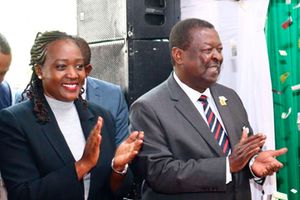Explainer: What is COP28?

People walk past a COP28 logo ahead of the United Nations climate summit in Dubai on November 28, 2023.
What you need to know:
- It comprises representatives from 197 countries and was created in 1995.
- The COP meets each year to review how the Convention is being implemented and discuss new climate agreements.
- The COP typically meets for two weeks and brings together representatives from governments, businesses, and civil society.
The Conference of the Parties (COP) is the highest decision-making group for the United Nations Framework Convention on Climate Change (UNFCCC). It comprises representatives from 197 countries and was created in 1995.
The COP meets each year to review how the Convention is being implemented and discuss new climate agreements.
Some crucial moments in the COP's history include COP3 in Kyoto, Japan, in 1997, which agreed to the Kyoto Protocol, COP15 in Copenhagen, Denmark, in 2009, which supported the Copenhagen Accord and COP21 in Paris, France, in 2015; which approved the Paris Agreement.
COP26 was held in Glasgow, Scotland, in 2021 and focused on finalising the rules for the Paris Agreement and finding ways to reduce emissions. The COP typically meets for two weeks and brings together representatives from governments, businesses, and civil society.
The Subsidiary Bodies for Scientific and Technological Advice (SBSTA) and Implementation (SBI) set the agenda.
The COP process is essential for international cooperation but can be complex. It is expected that the process will change to be more inclusive, transparent, and considerate of developing countries' needs.
Future COPs will focus on implementing climate pledges through effective collaboration and ambitious agreements for success.
COP28 will take place in Dubai from November 30 to December 12, 2023, and aims to assess progress in implementing critical climate instruments and encourage broad engagement surrounding climate issues.
It will have representatives from various levels of authority, governments worldwide, civil society, and the news media.
The conference will adhere to UNFCCC draft rules of procedure, navigating a complex landscape of negotiation and compromise.
The Bureau of the COP/CMP/CMA will play a crucial advisory role. COP28 may establish subsidiary bodies or adopt new legal mechanisms to develop and implement these critical instruments further.
The COP28 programme aims to bring together government officials, young people, businesses, investors, civil society, indigenous communities, and others to address climate change.
The programme is focused on specific solutions that need to be implemented in the next 10 years to limit global warming to 1.5 degrees Celsius, build resilience, and mobilise finance at scale.
These solutions are in response to the Global Stocktake, which measures the world's progress on climate action and support, identifies gaps, and develops solutions for the future up to 2030 and beyond.
The COP28 conference is a crucial opportunity for the international community to tackle the urgent challenges of climate change.
The programme will highlight sectors and topics brought up during consultations. These include energy, finance, and new health, trade, relief, recovery, and peace issues. The conference emphasizes the need for collective action and commitment to sustainable solutions.
This year’s conference will focus on four key themes:
- Accelerating the transition to clean energy (fast-tracking a just and orderly energy transition).
- Boosting climate finance (fixing climate finance).
- Protecting nature and people (focusing on people, nature, lives, and livelihoods).
- Mobilising for an Inclusive Climate Action (fostering inclusivity).
Common Terms Surrounding COP
The Kyoto Protocol, established in 1997 at COP3 in Kyoto, Japan, was the first legally binding emission agreement, committing 'developed' countries to limit and reduce greenhouse gas emissions.
The Kyoto Protocol targets developed nations for their primary greenhouse gas emissions. It introduces market-based mechanisms like Emissions Trading, enabling countries emitting less to sell excess allowances, creating economic incentives for emission reduction.
The Clean Development Mechanism and Joint Implementation allow governments to invest in emission-reducing projects, earning credit points.
Adopted at COP21 in 2015, The Paris Agreement marked a significant milestone in the UN-led The Paris Agreement, established in 2015, addresses global climate change through long-term goals, aiming to limit temperature increases.
With 195 Parties, it's a legally binding treaty requiring countries to submit updated plans (Nationally Determined Contributions - NDCs) every five years for emission reduction and resilience-building.
It requires developed nations to support developing ones, fostering transparency and collective progress monitoring.
The Agreement is a durable framework guiding global efforts toward a net-zero emissions world and is crucial for achieving the Sustainable Development Goals.
The Global Stocktake (GST)
The global stocktake, occurring every five years, assesses collective progress toward Paris Agreement goals.
Like taking inventory, the process identifies gaps in climate action and support. Decisions at COP28 will influence nations' following climate action plans (Nationally Determined Contributions - NDCs) due in 2025.
It informs policymakers, aiding the strengthening of climate policies and commitments for accelerated action, addressing the urgency of limiting global warming to 1.5 degrees Celsius.





